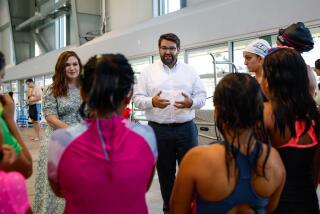Albright to Chart New Course in Foreign Policy
- Share via
WASHINGTON — New Secretary of State Madeleine Albright declared Friday that she intends to take a road less traveled during her term--crisscrossing this country to try to convince Americans of the need for a strong, engaged U.S. foreign policy.
“We intend to schedule many events around the country--some speeches, some town meetings, some simply discussions,” she told a group of reporters crowded into the State Department’s briefing room for her first news conference since being sworn in as the nation’s 63rd secretary of state. “We have a strong case to make, but we cannot expect that case to explain itself.”
Claiming that she has no desire to eclipse her predecessor, Warren Christopher, as the most-traveled secretary of state in American history, she said that her first trip, “already taken and to be followed by many more, was to Capitol Hill.” She said she hopes to work with the Republican-led Congress on a bipartisan basis.
Her comments come at a time of public indifference--and some skepticism--about the need for an active American global role, even though the U.S. is the world’s most powerful nation. This mood, coupled with severe budgetary pressures in Congress, has led to major cuts in foreign affairs spending over the last decade. Albright’s comments underscore that reversing those cuts is an important priority.
Answering questions that ranged from the Middle East to China to relations with Russia and Cuba, she displayed a solid knowledge of the issues, yet broke little new ground.
But if the substance of her responses varied little from those of her predecessor, the sense of energy she exuded and her fluent, lively style at the podium left little doubt that a new era of diplomacy has come to American foreign affairs.
It is an era that, if nothing else, promises simpler, more direct explanations of what the Clinton administration wants to do in the world.
“The major goal of American foreign policy is to make sure that the American people are safe, secure and prosperous and are able to operate within a safe, secure and prosperous world,” she said.
On specific issues, her penchant for discarding complex language brought some confusion, at least initially. One State Department source reported a query from a foreign reporter asking if Albright’s description of Sino-U.S. ties as a “multifaceted relationship” instead of the usual term, “comprehensive engagement,” constituted a shift in policy.
Among Albright’s comments:
* On her global outlook, she referred to America’s key alliances and important relationships as “the bonds that hold together not only our foreign policy but also the entire international system. Thus we see our most important task as sustaining momentum toward the creation of a Europe that is united, stable and democratic, and an Asian Pacific community that cooperates, increasingly, based on shared economic interests and a common commitment to peace.”
* On China, she promised to “tell it like it is on the human rights issues and on Hong Kong . . . when I meet with them” but then retreated to the administration’s existing policy--that relations with Beijing are too important to be “held hostage to any one issue.”
* On North Atlantic Treaty Organization expansion, she played down the importance of Moscow’s opposition to the alliance’s planned moves eastward, stating: “We understand that the Russians have some problems with that, but what is clear is that both countries are committed to working this situation out and developing mutual understanding on our national interests.”
* On the Middle East, she called it “important for the secretary of state to be involved in the . . . peace process” but indicated that she has no immediate plans to visit the region.
* On Cuba, she noted the recent arrest of more dissidents there and claimed that there is no evidence that President Fidel Castro has eased his repressive rule. “He is a dictator who runs his country in the way that dictators did in the ‘50s and ‘60s. Cuba is an embarrassment to the Western Hemisphere.”
Albright is scheduled to receive her first foreign visitors early next week, when two senior European Union officials travel to Washington.
She said she will make her first official trip abroad next month, including stops in Europe and Asia. Aides talked of a round-the-world trip of about 10 days to major capitals but stressed that both the stops and timing remain fluid.
More to Read
Get the L.A. Times Politics newsletter
Deeply reported insights into legislation, politics and policy from Sacramento, Washington and beyond. In your inbox twice per week.
You may occasionally receive promotional content from the Los Angeles Times.










